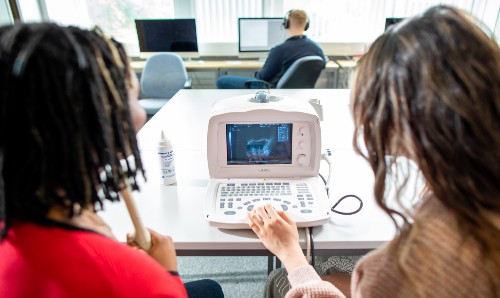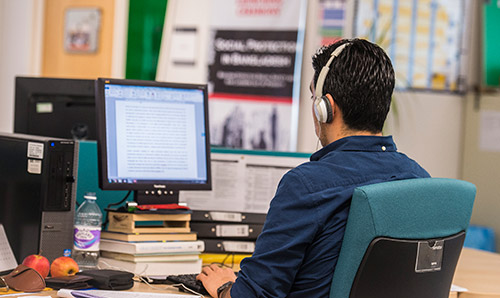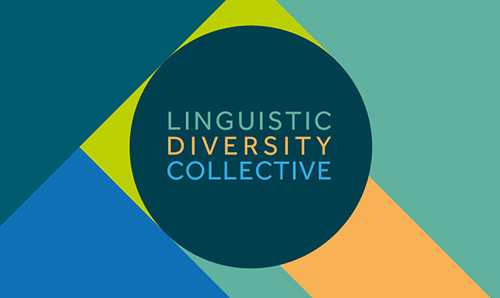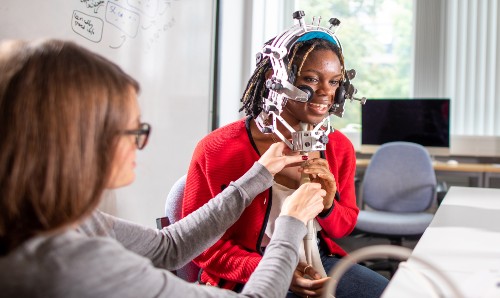
Research
Research in Linguistics and English Language at The University of Manchester is characterized by an exceptional breadth of expertise.
We investigate all aspects of language structure (phonetics, phonology, morphology, syntax, semantics, pragmatics) and their interactions from a wide variety of perspectives (formal, typological, historical, developmental, societal, and cultural).
Our work breaks down traditional boundaries in a number of ways: for example, by pursuing syntheses of synchronic and diachronic explanation; by driving theory development through the use of data from under-described languages and non-standard varieties; by testing formal models against quantitative data from sociolinguistic variation and laboratory experimentation; and by bridging the division between linguistic and cultural studies, with particular reference to the creation of identity.
The empirical base of our research is outstandingly broad, not only methodologically, but also typologically. Thus, alongside an exceptionally large cluster of experts on English language, we have particular strengths in Romance, Germanic, Indo-Iranian, the languages of Latin America, and the languages of Australia.
Research into the history and linguistics of English
The University of Manchester produces some of the most authoritative research into the history and linguistics of English.
Manchester scholars are authors, editors, or contributors of many of the latest key reference works and textbooks on the English language.
Some of our recent research includes a project on the roots of verbal meaning by Andrew Koontz-Garboden, research on phonetic conditioning in Manchester dialects by Maciej Baranowski and early language development in infants from ethnic minority backgrounds by Thea Cameron-Faulkner and Elena Lieven.
You can view all of our latest publications here.
Manchester regularly hosts major international conferences on English linguistics:
- Directions in English Language Studies (April 2006)
- The Tenth International Conference on English Historical Linguistics (August 1998): click on the highlighted link for a description of the conference volume.
Research areas
Manchester scholars conduct research into all aspects of the English language, from its structure, history, varieties, and socio-historical setting, to the applications of English linguistics.
We have three broad thematic strands of research:
- Language, the individual and society;
- The context of linguistic variation;
- Linguistic sound patterns & the influence of lexical and morphological information.
Our descriptive goals, both diachronic and synchronic, include empirical techniques, including philology, corpus linguistics, and quantitative sociolinguistic methods.
At the same time, our work on English is informed by, and aims to contribute to, the latest developments in linguistic theory. In this vein, Manchester scholars apply a variety of theoretical perspectives to the synchronic and diachronic study of English, including construction grammar, lexical-functional grammar, minimalism, and optimality theory. Our research also uses the techniques of linguistic typology to define the place of English within the diversity of human language.
Some examples of how our research on English unites descriptive, societal, historical, and theoretical concerns include:
- Cross-Language Dynamics: Reshaping Community, an Open World Research initiate that explores the role languages play in relation to key contemporary issues, such as social cohesion, migration, health, business and diplomacy;
- Romani Project, research into the Romani language and its dialects that’s helped develop the first ever online multi-dialect dictionary.
For the research interests of individual members of our 17 academic staff, see our staff list.
Languages research
Research in Linguistics and English Language is carried out in the context of our affiliated research centres and linked divisions; supporting interdisciplinary collaboration in the School of Arts, Languages and Cultures and beyond.
Notably, our Division is one of the partners in the Manchester Q-step Centre, which aims to promote training in quantitative research skills.
Beyond the School of Arts, Languages and Cultures, we also work with colleagues in the Faculty of Biology, Medicine and Health and the School of Social Sciences.
Find out more about all of our ongoing Projects.

Projects
Find out more about current and completed projects from the Linguistics and English Language team.

Postgraduate research
Find out why The University of Manchester is a vibrant research community.

Linguistic Diversity Collective
Discover how we're researching and championing linguistic diversity both locally and globally.

Facilities
Check out the cutting-edge resources available at The University of Manchester.
Publications
Browse our research outputs and publications.
Read more
Keep up-to-date with the latest news from the Linguistic Diversity Collective.
- Wednesday, 19 October 2022 - LDC free panel discussion, 'Supporting Manchester's language communities: Language endangerment and maintenance'
- Tuesday, 28 June - 1 July 2022: TripleAFLA conference took place, organised by LDC members
- Saturday, 25 June 2022: LDC at the University’s Community Festival 2022
- Wednesday, 15 June 2022: Two LDC workshops took place at Manchester City of Literature’s Festival of Libraries
Resources
Get involved
The LDC are available to engage with local school pupils on the subject of linguistic diversity and to support and enrich the work of third sector organisations such as community groups and language schools.
If you’d like to discuss this, or for any other queries, contact us at LDC@manchester.ac.uk
To hear about upcoming events or news about our work, see our news updates above or sign up to the Creative Manchester newsletter.
Connect
Connect with the Linguistic Diversity Collective wherever you are through our social media channels:
